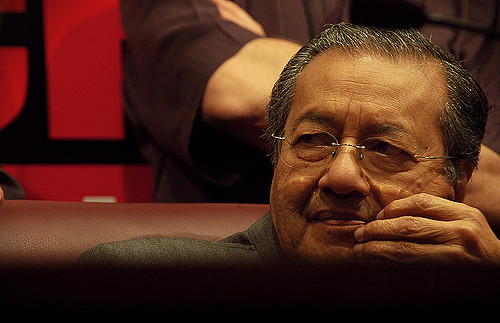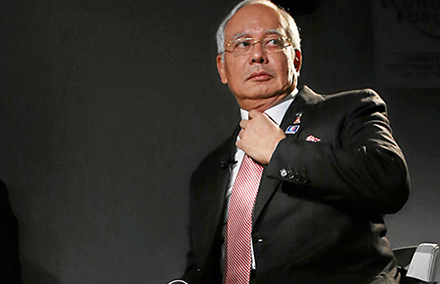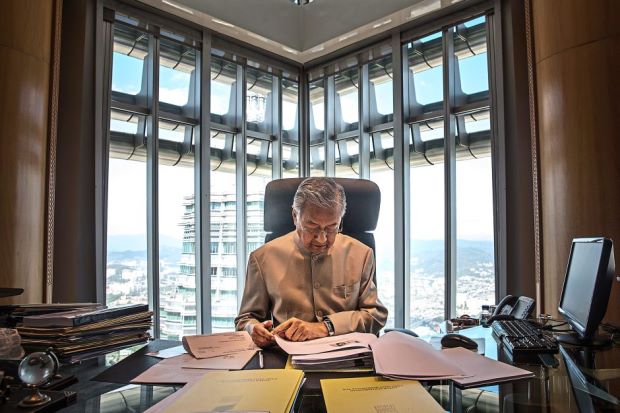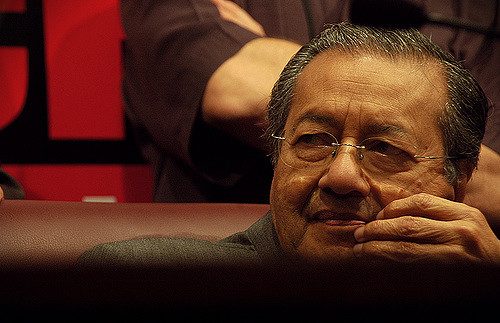
Photo: Udey Islamil on flickr https://www.flickr.com/photos/udeyismail/
In Malaysia, it’s not a clash of the titans that sees major personalities rule. Rather, political institutions are set up to keep the country’s leaders in power — regardless of who sits in the top position and how weak they are.
Like Singapore’s Lee Kuan Yew and Indonesia’s Suharto, the long reign of Mahathir Mohamad, who held the reins of power from 1981 to 2003, marks a period of personified politics for Malaysia.
Malaysian scholar Khoo Boo Teik even coined the term ‘Mahathirism’to typify the man’s contentious politics, development focused economics, and a foreign policy that was strident and very intimate to Mahathir’s world view.
As the ‘Grand Old Man’ of Malaysian politics still looms over his successors, some would argue the ‘Mahathir factor’ is very much alive today. Observers and activists still hold their breath in anticipation of Mahathir’s upcoming political moves after he filed a lawsuit and started a campaign to Save Malaysia, supported by many of his former political adversaries in a bid to oust scandal-soaked Prime Minister Najib Razak.
However, as the casualties of his ‘oust Najib’ campaign pile up, including a Deputy Prime Minister, a Menteri Besar (first minister of a state), and an Attorney-General, the Prime Minister’s seemingly unshakable position prompts one to ask whether Mahathir has lost his charm?
Or has UMNO politics transitioned from the kind of personified politics many would associate with its neo-feudal setup; one where warlords reign supreme and loyalty to the party leader is widely held as a tradition, obligation, and virtue?
UMNO’s obsession with personified politics is nothing new. The party’s major rifts since the Mahathir era have always been seen as battles between giants; Mahathir’s clashes with Tengku Razaleigh/Musa Hitam in 1986; Anwar Ibrahim in 1998; and Abdullah Badawi (and then Mr Najib) in the post-2008 era.
Even now, attempts to challenge Najib are portrayed as personality-centric. By collaborating with the opposition, the 90-year-old Mahathir is seen as stepping into the leadership void left by the highly charismatic, albeit imprisoned Mr Anwar.
It is also reported that Mr Razaleigh, Malaysia’s longest serving MP, was allegedly planning a parliamentary coup. The political maneuvering seems to be a game of musical chairs favouring political veterans.
Yet, such House of Cards-esque description of Malaysian politics, where power is personified and the winner is the ultimate Machiavellian champion misses one point; the advantage of incumbency is institutionalised rather than personified — even if the prime minister’s opponents are mustering support based on personalities.
Even in the public domain, personified politics do not fare well. Najib’s attempt to capitalise on his personal popularity via the 1Malaysia campaign, a program he initiated calling for politicians and bureaucrats to emphasise ethnic harmony and national unity, has failed miserably – despite his approval being greater than his own party’s at the time. Having lost the popular vote in the 2013 election, it was only the electoral system, and some rural gerrymandering, that kept him in power.
Seen in this perspective, former PM Badawi’s resignation is likely a matter of personal choice rather than an inevitable event after the traumatic 2008 election results – which saw the long-ruling Barisan Nasional led by UMNO win an election by its slimmest margin ever. In hindsight,
Dr Mahathir’s long-term survival in the party, despite the many close-shaves, is also as much about political shrewdness as it is about the fact that he enjoyed institutionalised power for being Prime Minister and UMNO’s president.

Photo by Mirko Ries/ World Economic Forum on flickr.
The paradox of a weak party and a strong state
The post-2008 reality marks an interesting period in Malaysia; a paradoxical situation where a weak governing regime presides over a strong state. However, it is also the presence of a strong state that allows for the institutionalisation of power, as the command structure is clear and not to be violated.
As much as many would like to describe Malaysia as a ‘failed’ state, the fact remains that the state has been able to maintain a strong, if not authoritarian, grip over the nation.
Unlike Indonesia, the Philippines and Thailand, there are no pockets of rebellion or lawlessness within Malaysia. The secessionist (or parochial) calls by certain parties in Sarawak and Johor are merely rhetorical. The government has also handled the so-called Islamic State (IS) threat convincingly so far, unlike the aforementioned countries where attacks has been successfully carried out by IS, or its affiliates.
Extractive capacities remain strong, as seen in the imposition (and execution) of the unpopular Goods and Services Tax (GST); a success that proves to be a saving grace to a weakened economy threatened by currency devaluation and low oil prices.
Nevertheless, the ability to regulate and control does not automatically translate to popularity, more so in the face of a mega-scandal that involves the 1MDB state fund and the prime minister’s personal bank accounts. The government’s approval rating has recently sunk to an all-time low of 23 per cent.
More importantly, Malay support, which has been the prized vote bank of UMNO, has plummeted from 52 per cent to 31 per cent in just 10 months (January- October 2015), breaching the 50 per cent mark for the first time since polls were first taken in 2012.
A popularity crisis will call for greater institutionalisation of power, whether through legal or extra-legal means, to buttress and secure the position of the leader. Institutionalised power — in the authoritarian sense — differs from personified power, for it allows for powers to be centralised and accrued to the apex position regardless of who sits in that position.
The Malaysian case, where the investigation of the 1MDB affair was swiftly closed by a newly minted Attorney General after his predecessor was removed in a sudden turn of events, and despite the Central Bank thinking otherwise, stands in contrast with Brazil — a nation also embroiled in a mega-scandal involving a state-owned agency, Petrobras.
Institutions in Brazil were not set up to support the weakened leadership. Instead, judges and prosecutors have shown fierce independence, to the point of detaining former president-cum-Chief of Staff, Luiz In├бcio Lula da Silva, for investigation.

The view from the top: Mahathir working on the 86th floor of the Petronas Towers. Photo: Wikimedia commons
The methods and dilemma of institutionalised authoritarian power
Many avenues are available to institutionalise authoritarian power. Chief of all, it is the ability to dictate, control and deploy coercive apparatus (empowered by legislative tools), not only towards perceived external detractors (such as blocking news websites), but also internal ones, as in the case where the investigators of an ongoing scandal were themselves investigated.
Another vital component is the institutionalisation of an electoral system that disadvantages the opposition so that legitimacy of rule is still preserved through the semblance of ‘democracy’. Findings from the University of Sydney and Harvard University-based Electoral Integrity Project conclude that the 2013 General Elections were of “low integrity“.
Finances also matter as there is a need to sustain a patronage-based political economy, which is enabled by the state’s deep tentacles into the economy. A cursory review of the top 10 largest companies by market capitalisation reveals how Government-Linked Companies (GLCs) and conglomerates with strong government-ties continue to dominate the Malaysian economy.
To be sure, such institutionalisation of power at the Prime Minister’s position did not begin with Najib.
It can be traced back to Dr Mahathir’s era of domination where governments institutions were subverted via subjugation (as in the case of the judiciary), homogenisation (the reduction of ethnoreligious diversity in the civil service), and ideational reconditioning (through the use of the infamous national civics bureau, or BTN, where civil servants were allegedly ‘inculcated’ with the doctrine of Malay supremacy and anti-opposition rhetoric).
The incumbency advantage were also extended to the party level, for example, through a now defunct electoral rule that stipulated UMNO’s presidency could only be contested by candidates that secured 30 per cent of nominations from 191 delegates.
However, a dilemma exists whereby the process of institutionalising power actually weakens the institutions involved in exercising such powers.
The outcome is an expanded yet docile ethnocratic bureaucracy that is competent enough to ensure regime preservation, yet not necessarily so in terms of delivering good governance — unlike the case of capacity-orientated institutional building in the equally strong-state Singapore.
In any case, total subversion can never be completely achieved. Having demonstrated certain proclivities of its own, the religious bureaucracy, also greatly strengthened during Dr Mahathir’s era, is expected to be a wild-card in the future.
That said, conformity is expected for now, as the religious bureaucrats dovetail comfortably with the government’s ‘Islamic’ agenda, reveling in the attention, protection, and budgetary endowments received.
The limits of institutionalised power
The importance of institutonalised power in Malaysia’s political system is also reflected in the fact that personified and ideological politics is much more prevalent in opposition parties, such as the Anwar factor in PKR, as well as DAP and PAS’s secularism versus Islamist dichotomy.
The lack of institutionalised support makes these characteristics important binding factors within these parties. But ironically, it also makes building coalitions among such parties difficult – if not impossible.
However, institutionalisation of power does have its limits. The fact that the federal government still needs to please and pacify political parties in East Malaysia, like the 29.2 billion ringgit worth of developmental projects (even in times of government austerity), demonstrates that a weak party still requires popular support.
What is clear is that personified power, if indeed invoked, has very limited utility in challenging a position that has access to unchecked, centralised and institutionalised power. In this sense, a solution in the form of a ‘Save Malaysia’ messiah from the opposition would most likely be a pipe dream.
As such, two pertinent questions need to be asked. First, if the opposition is deprived of institutional means to challenge Mr Najib, the only alternative they can resort to is mobilising popular support, be it via electoral or non-electoral means.
In the event of such a success (which is a gargantuan task to begin with), would a standoff between institutions and the people occur? Where is the tipping point where the reliance on institutional means can no longer justify the preservation of unpopular power?
Second, if current events have demonstrated the privileges of institutionalised power, is there any incentive for those who seek power to reform it?
Nicholas Chan is a postgraduate student with the S Rajaratnam School of International Studies.
 Facebook
Facebook  Twitter
Twitter  Soundcloud
Soundcloud  Youtube
Youtube  Rss
Rss 